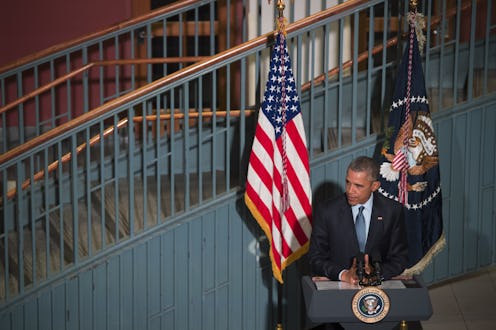News
Why Obama's Historic Visit To Newark Matters
It only took about seven years, but the president finally made it to Newark, New Jersey. President Obama made a historic visit to Newark on Monday to discuss a platform which critics say he has neglected during his tenure: criminal justice reform. After touring Integrity House, a drug addiction treatment center in the city's Lincoln Park neighborhood, Obama ended his Newark visit at Rutgers School of Law, where he introduced two new criminal justice reform initiatives which he believes will help end the cycle of mass incarceration both here in Newark and in all 50 states.
"It's good to be in Newark!" Obama said as he entered the atrium, where an audience of under 100 people were gathered. Many in the audience, as the president noted later in his speech, were employees of New Jersey's justice and correctional system, ranging from prosecutors and judges to formerly incarcerated individuals who have found a new life outside prison.
New Jersey Sen. Cory Booker, who formerly served as the mayor of Newark, sat in the front row as Obama announced his new initiatives. Booker was joined by current Newark Mayor Ras Baraka and former New Jersey Gov. Jim McGreevey. (Notably missing from this star-studded audience of New Jersey legislators was Gov. Chris Christie.)
The speech was off-limits to Rutgers-Newark students and most faculty. However, that didn't stop students and Newark residents from lining the streets around the campus. Some held "Stop Racism" placards, while others waved signs urging for the end to mass incarceration. One member of the crowd held a sign in support of Assata Shakur, the former Black Panther Party member who was famously imprisoned at (and later escaped from) a women's correctional facility about 40 miles west of Newark.
That Obama chose Newark as the location from which to announce his new initiatives is no coincidence; the city has become a model for prisoner rehabilitation. Newark boasts a successful prisoner reentry program, established in 2008 by a $2 million federal grant. The city also has a number of programs, such as Integrity House, which have helped formerly incarcerated residents with substance abuse issues since 1968.
"I've been really hopeful, because what I've seen is people across the board ... who are saying there's got to be a better way to do this," Obama said, giving a shout out to Integrity House for being "a model" for other programs and cities. "They are accomplishing extraordinary things. We're going to help them see what more they're going to accomplish."
In many ways, Newark is a microcosm for mass incarceration in America. According to a 2012 Department of Labor report evaluating Newark's re-entry initiative, a quarter of Newark residents have been involved in the criminal correction system in some way — that's 70,000 residents in all. An estimated 1,700 formerly incarcerated individuals also return to Newark each year. A majority of these individuals served time in state prison.
These numbers might seem astounding, but as Obama mentioned on Monday, they're just a sample of America's mass incarceration crisis. The president, citing statistics from the Department of Justice, said there are currently 2.2 million Americans behind bars nationwide. "Almost all of these individuals will eventually be released," Obama said Monday.
He added that one in five Americans have a criminal record, which more often than not disqualifies them for jobs. "That's bad for our economy. It's bad for our community," the president said.
As Newark disproportionately suffers from mass incarceration and a flawed criminal justice system, Obama's words weighed heavier on those in the audience. When Obama announced that he will take action to "ban the box" — the criminal offender check box on applications for federal jobs — the audience erupted in cheers, applause, and a collective sigh of relief.
"When it comes to the application, give people the chance to get through the door," Obama said.
It's only fitting that Obama made this announcement alongside Booker, who's currently working on federal legislation that would remove the box from all job applications. The president reaffirmed his support for the bill, adding with a smirk that "It's not difficult for Democrats and Republicans to get together on useful legislation."
Shade-throwing aside, Obama's speech took a heartfelt turn when he went off-script a bit. He talked about one Newark man in the audience whom he met that day — a formerly incarcerated man in his 30s who found new opportunities after leaving prison thanks to Newark's reentry program. Obama praised the man's probation officers, a local prosecutor, and a judge for all helping him obtain a job as an EMT in Essex County.
"The problem we're trying to solve is not just catching people and putting them back in jail," Obama said. "The goal is to prevent crime and to make sure folks are fairly punished. But it's also to make law-abiding, self-sufficient citizens. That's our goal."
"It's not too late," the president added before leaving the stage. And the people of Newark applauded in agreement. It seemed like the president was, truly, talking to Brick City.
